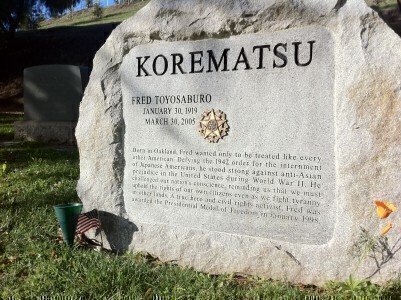It was 69 years ago today that the Supreme Court handed down the Korematsu decision, which validated putting American citizens in internment camps during wartime conditions – based on their race or ethnicity.
 The decision is often regarded as one of the three worst handed down by the Court in its long history. In 2009, Los Angeles Times Supreme Court correspondent David G. Savage said that Dred Scott, Plessy and Korematsu were the three Supreme Court decisions that liberals and conservatives agreed were historically bad. “After that, it depends on which side of the political aisle the experts occupy,” he said.
The decision is often regarded as one of the three worst handed down by the Court in its long history. In 2009, Los Angeles Times Supreme Court correspondent David G. Savage said that Dred Scott, Plessy and Korematsu were the three Supreme Court decisions that liberals and conservatives agreed were historically bad. “After that, it depends on which side of the political aisle the experts occupy,” he said.
The December 18, 1944 majority decision has been picked apart over the years by legal scholars and its anniversary duly noted. But as the 2016 presidential election approaches, the debate over Korematsu has new life, as one of the key points in the controversial Muslim Ban proposed by Republican candidate Donald Trump.
Trump has started an intense national debate among voters – and scholars – about his proposal to temporarily exclude the entrance of Muslims into the United States until authorities can properly determine a general terrorist threat.
Trump frequently pointed to the Roosevelt administration exclusion orders when the businessman announced his proposed Muslim ban earlier this month. “What I’m doing is no different than FDR,” Trump told ABC on December 7. “If you look at what he was doing, it was far worse … and he’s one of the most highly respected presidents — they name highways after him,” Trump said.
The big difference between Trump’s proposal and FDR’s executive orders is that Trump would seek to ban Muslims, a religious group, from entering the United States, while Roosevelt restricted the constitutional rights of an ethnic group already in the United States (and in many cases, who were legal citizens).
The current legal debate over Trump’s proposal is more focused on the established powers of Congress to establish immigration policy and a canon of older Supreme Court cases about immigration exclusions based on race and other characters.
Stanford Law professor Jenny Martinez told NBC News earlier this month that she saw Korematsu involved in this debate in a general context. "To the extent there are precedents for this kind of blanket discrimination, they are ones, like the Japanese internment camps upheld by the Supreme Court in Korematsu, which all reasonable constitutional experts consider tragic mistakes that we should not repeat."
Among other scholars, Korematsu’s legacy is related to the proposed Muslim ban in broader ways. Temple Law’s Peter Spiro, in a widely read New York Times op-ed piece, noted that Korematsu’s impact is the existence of a broad social stigma on race-based court decisions. “Technically, it remains good law. But it has been effectively overridden by other actors, and in the court of public opinion,” Spiro argues. “Korematsu continues to provoke popular shame.”
And there are now often-repeated quotes from Justice Antonin Scalia in 2014 about Korematsu that have resurfaced recently. Speaking at an event in Hawaii in 2014, Scalia said Americans shouldn’t assume that another Korematsu situation couldn’t occur in a wartime situation. “You are kidding yourself if you think the same thing will not happen again,” Scalia said, citing a Latin phrase meaning, “in times of war, the laws fall silent.”
“That’s what happens. It was wrong, but I would not be surprised to see it happen again—in time of war. It’s no justification but it is the reality,” Scalia said.
On C-SPAN’s Landmark Decision series, co-sponsored by the National Constitution Center, Karen Korematsu, Fred Korematsu’s daughter, recently spoke about the decision’s broad impact and Scalia.
“Unfortunately, Korematsu v. the United States in 1944 is more relevant today than it was then. Clearly, the lessons in many cases have not been learned. We keep repeating these mistakes. For Justice Scalia to make that quote now during this time is very scary,” she said.
So what of Korematsu’s legacy in 2015? Writing today in the Los Angeles Times, scholars John Inazu and Karen Tani wrote, “Korematsu told our U.S. citizen grandparents, Lily and Taizo Inazu and George and Yoshi Tani that their freedom could be taken, their rights ignored and their lives disrupted, solely because of their ancestry. … That shadow pushed us to become legal scholars and teachers.”
Inazu and Tani also acknowledge the reality that Korematsu is still a legally valid decision. “As we wait for the Supreme Court someday to overrule Korematsu, we hope that our fellow citizens will choose to overrule it in their own way — through lives and choices that testify to a different vision of this country,” they said.
Scott Bomboy is the editor in chief of the National Constitution Center.







